- Home
- Pam Jenoff
The Last Summer at Chelsea Beach Page 3
The Last Summer at Chelsea Beach Read online
Page 3
“But how did you manage that? Oh, never mind,” Aunt Bess added before I could share my tale. She took me by the arm. “Oy, you’re all bones.” The comment stung. Before I’d left Trieste I’d been developing, with new curves that made my clothes fit differently. But all that seemed to melt away during the days of hunger on the ship and now my elbows and knees stuck out like a scarecrow’s.
“You must be hungry,” Uncle Meyer offered more kindly.
“A little,” I lied, nearly swooning at the mention of food. My eyes traveled once more toward the stack of pretzels on the hot-dog cart.
But Aunt Bess opened her purse and fished out a bagel wrapped in tissue. She dusted off a bit of lint that had stuck to the corner and handed it to me. “Thank you,” I managed, trying to mask my disappointment as I bit into the stale, crusty bread. I gulped the first mouthful, then forced myself to slow down as my stomach roiled.
“You don’t have bags?” I shook my head. “We’ll have to get you some things,” Aunt Bess said, as though it had only just occurred to her. I followed them to a black car at the corner. “We’re headed to the shore. That is, the beach. Atlantic City. We take a place there in the summer. It’s nothing fancy, just a few rooms in a boardinghouse. But we thought the sea air might do you good.” Aunt Bess spoke quickly, using too many English words that I did not know. “Do you understand?”
She must have noticed my confusion. I tended to wear my emotions on my face—a habit I’d been trying to break. “Si. I mean yes.”
“You’ll like that, nu?” Uncle Meyer asked, his whisper kind. I did not answer. How could I explain that, even though I’d been raised in coastal Trieste, the ocean was in fact the one thing I hated most?
A tear escaped from my right eye then and trickled down my cheek. “Oh, dear,” Aunt Bess said, mistaking my sadness for gratitude and hugging me awkwardly. I let myself be folded into her stiff, unfamiliar arms and took a step into the life that was waiting for me.
Hearing the screen door slam behind me, I shielded my eyes and peered up at the slope-roofed beach duplex where we occupied the second floor. Aunt Bess labored down the rickety wood steps, straw purse tucked under her arm. Though it was not yet midmorning, the sticky July heat had already caused damp spots to form at the armpits of her dress. “I’m headed to Margie’s.” Aunt Bess’s routine was always the same, the only question if it was canasta at Margie’s or mah-jongg at Flo’s. “Do you want to come?”
I considered saying yes, just to see her reaction. “No, thank you.” Aunt Bess’s shoulders dropped slightly with relief. She hesitated in that way she always did, not quite sure what to do with a teenage girl whom she’d only just inherited less than a month earlier. Things were especially awkward during the week. Uncle Meyer traveled in the Buick, selling pots and pans and other household items to the housewives of Elkins Park and Cheltenham and other neighborhoods northeast of Center City. Until he returned Friday afternoons, it was just Aunt Bess and me. “There are some leftover prakas—I mean cabbage rolls—in the icebox for lunch.” Aunt Bess’s family had come from Pinsk some thirty years earlier, fleeing the pogroms. She regarded herself as American, but little bits of the old country seeped through, like a white slip peeking out beneath the hem of her dress. Sometimes I felt as if I were an embarrassment to her, the immigrant niece a reminder of the world from which she’d tried so hard to distance herself. “There’s cheese for sandwiches and some potato salad,” she continued, as if rattling off a grocery list. She was forever trying to feed me. “I’ll be back this afternoon.”
I watched as Aunt Bess padded, dingy white sandals scraping, down to the corner of Monmouth Avenue. She was not an unkind woman; she simply did not know how to do this, like a muscle stiff from lack of use. I did not dare to ask if she ever wanted kids of her own.
I was supposed to be grateful, I knew, from the looks and not-too-low whispers of Aunt Bess’s friends. Grateful to her and Uncle Meyer for the clothes that were new, but not quite the right size, and for the secondhand books that were a few years too young for me. Grateful that they had taken me in, even though they really hadn’t had a choice. And I was grateful, but I wished they might just once ask me what I wanted, or even let me choose for myself.
When Aunt Bess had disappeared from sight, I climbed the steps of the duplex and went inside for some calamine lotion. We had two rooms, if you counted the screened sundeck with the daybed that made me an easy target for the mosquitos as I slept, plus kitchen privileges down below. I rubbed the lotion into my legs, avoiding the scrape on my left knee. Then I straightened, licking the salt from my lips and peering out across the horizon where greenish bay water met overcast gray sky.
My hand wrapped reflexively around the mizpah pendant, fingers feeling the engraved Hebrew: May the Lord keep watch between you and me when we are away from each other, or so Mamma had told me once when I was little and had asked about the charm around her neck. Hebrew was nonexistent in our home, and the item’s value to Mamma was sentimental, not religious. I had not taken it off since Mamma fastened it around my neck that night she put me on the ship. I pictured the other half in my father’s pocket, close to his heart. Sadness seemed to seep from the cool metal through my fingers as I thought of them and what might have happened in the weeks since I left. Had their lives had gone on much the same without me?
The sound of a car engine interrupted my thoughts. I looked down through the screen window, surprised. Our street was narrow and not a major thruway; vehicles this time of day other than the milkman and garbage truck were scarce. A boxy black station wagon lumbered into view, with suitcases strapped to the roof that looked ready to topple off at any moment.
The car stopped just past the duplex. I stood up, curious. The sprawling house next door with its wraparound porch had been vacant since we’d arrived three weeks earlier. Aunt Bess had sniffed at its dilapidated state, but I liked the empty place—I played under the eaves and even found a rabbit’s nest there. There had been signs in recent days that someone was working on it, though: a whiff of fresh paint coming from a suddenly open window, a pile of fresh lumber on the back porch. Once I thought I glimpsed a man through one of the windows, but when I moved closer to peer inside, he was gone.
But there was no mistaking the arrival now. A woman got out of the driver’s seat. She was pretty, with pale skin and strawberry-blond hair I would have loved for my own, and a smattering of freckles that said she’d better keep out of the sun if she didn’t want more. Behind her, several brown-haired boys spilled out of the car and raced toward the house, shouting and laughing. At first it seemed that there were too many to count. A little one, not more than ten or so, scampered ahead. He was followed by two boys about my age. They looked nearly the same, except one wore thick glasses. I’d heard of identical twins, but these were the first I’d actually seen. A dog bounded from the car, barking noisily at their feet.
Finally an older boy unfolded himself from the front passenger seat. He had long legs and wide shoulders, hair in a neat side part but that still curled at the edges. My stomach flipped, like the time Papa had taken me on a roller coaster at the carnival.
A family moving in. I waited for a father to appear, but the woman and the boys began unloading things and carrying them to the house. The oldest boy lifted a case from the roof of the car, his muscles flexing under his T-shirt. One of the twins hung back, head low, until his mother went to him and said something, cajoling a smile. They laughed at a joke I could not hear.
When the boys had finished unloading the boxes, they disappeared into the house. I looked down at the street, which seemed emptier than it had before they’d come. Then the screen door to the house next door banged open and the boys appeared once more. They jostled like puppies as they pushed outside. One of the twins carried a football, which the boys began tossing among them on the thin strip of grass that separated our two houses.
I watched the scene play out below, wanting to go down and join them. I stepped forward, starting toward the door that led downstairs. Then I stopped. But I kept watching, fascinated. The hair of the oldest boy seemed to glow gold in the morning sun. He didn’t so much run as fly, feet barely touching the ground. He leapt for the ball and his shirt pulled free, revealing a bit of midsection. I inhaled sharply at the unfamiliar sight.
“Hey!” a voice called out. It took a second to realize that it was directed at me. The youngest boy had his head tilted upward toward the porch, hand raised to shield his eyes from the sun. I stepped back from the window, but it was too late. He waved his brothers over. “A kid.”
The others stopped playing and gathered to peer up at me. “A girl,” the oldest brother corrected. “Don’t be shy,” he coaxed in a voice too rich and hypnotic to resist. “Come down and join us. We won’t bite.”
“We might,” the twin without the glasses taunted. I hung back. Then, curious and struck by the kindness of the oldest boy’s eyes, I opened the door and started down the steps.
“I’m Jack,” the twin with glasses said when I’d reached the bottom. He held out his hand. Closer I could see that he had a fuller face than his brother, splashed with freckles. Long lashes blinked behind the thick lenses.
I opened my mouth but no sound came out. “Adelia,” I croaked finally, wishing my accent was not so obvious.
The leaner twin cocked his head. “She must be the greenhorn from Italy that Dad mentioned.” How did they know about me? I blinked, caught off guard by the rudeness of his tone. My cheeks reddened and I started to turn. Coming downstairs had been a mistake.
“Don’t mind Liam,” said the oldest boy, his voice low and resonant. I stared up, not answering. He was even more handsome up close, with hazel eyes and a wide smile. Bright sunlight seemed to cast a halo of gold around him. “I’m Charlie.” My breath caught. I brushed my hair from my face, trying to think of something to say that would impress him, make him take notice. He cupped his hand on the head of the youngest boy standing beside him. “And this is Robbie.”
I smiled down at Robbie, who had wide, round cheeks that seemed to cushion his eyes, and front teeth still a bit too big. He stood very straight, trying to look taller in a way that I recognized from doing it myself. “Nice to meet you,” I said solemnly.
“Adelia,” Charlie said, as if trying my name on for size. Hearing him say it, my insides warmed. “That’s a mouthful. Is it okay if we call you Addie?”
I nodded, liking the short, easy sound. “Si. I mean, yes.” I blushed. My knowledge of English was not awful. Mamma had insisted that I learn other languages since I was a child. I had read as much as I could since coming here, mostly Ladies’ Home Journal and the other women’s magazines Aunt Bess loved. And I had listened to the radio programs, too. But I had not had much opportunity to practice speaking and when I was nervous it all seemed to fade away.
“Come meet our mother.” Before I could reply, Charlie strode across the lawn, covering it in about two steps. The others followed. “Mom!” The red-haired woman emerged from the house, wiping her hands on the apron that covered her light blue shirtwaist dress. “This is Addie. She’s staying next door.”
The woman smiled with a kindness that said she had heard about me. “Hello! We’ve been summer neighbors of your aunt and uncle for years, though we usually get here a good deal earlier. I’m Doris Connally.”
“Where did you come from?” Robbie interjected.
“From Trieste, in Italy. On a boat.”
“All by yourself?” he asked. I nodded, standing straighter.
“Well, that’s something,” Mrs. Connally said, her voice full of admiration. “I normally wouldn’t even make the trip down to the shore by myself, but my husband had to work and the boys wanted to be here for the fireworks on the Fourth.”
“Who lives there with you?” Robbie resumed his interrogation, pointing up to the screened porch where I had stood minutes earlier.
“Just my aunt and my uncle.”
“No brothers or sisters? Any pets?” I shook my head twice, trying to keep up with his questions. “Boy, you’ll sure be glad to have us around!” His brothers chuckled.
Robbie turned to his mother. “Can we keep her?”
“Robbie, she isn’t a puppy. But I do hope you’ll join us often,” she added.
“Because we really need more kids,” Liam said wryly. His words stung. But he did not sound as though he was trying to be mean, just truthful.
The yellow dog I’d seen earlier bounded down the porch steps and stopped at Liam’s feet. “This is Beau,” he added, face softening.
“Jack and Liam must be about your age,” Mrs. Connally remarked.
“I’m sixteen.” I heard my accent again, the way my voice did not sound like theirs.
“I’m taller,” said Liam improbably.
“Okay,” I conceded, because it seemed to matter to him a great deal.
“Would you like to join us for lunch?” Mrs. Connally offered. “I haven’t much ’til we get to Casel’s, just sandwiches.”
I still could not get over the way Americans spoke so casually of food—something I would never again take for granted. “I wouldn’t want to impose.”
Mrs. Connally smiled. “Hardly. With these boys, I’m already cooking for an army. Come on, everyone. Let’s eat.”
Charlie lifted Robbie across his shoulders like a sack of potatoes and started for the door with the twins at his heels. Inside, the house was airy and cool. There were little touches, like the carved oak bannister and wide windows, that said the house had been built for someone to live in year-round, and not merely as a vacation home.
As we passed through the living room, I paused to admire a chess set which sat already unpacked on a low table. “It’s lovely,” I said, fingering one of the carved wooden rooks.
“Do you play?” Charlie asked with new interest.
I tried to calm the fluttering in my stomach. “I did. My father taught me.” In recent years when he had become broken and withdrawn, it was my one way to still connect to him. Papa had no one to play with him now. I imagined the chessboard sitting unused by the fireplace in our apartment in Trieste. It had been my dearest possession—the one thing I might have brought with me, had I known I was going.
I followed Charlie through the open boxes that littered the floor to the freshly scrubbed kitchen smelling of lemons. Mrs. Connally unpacked a basket of meats and cheeses and began slicing thick white bread. My stomach rumbled embarrassingly. Even after several weeks here, every meal felt as though it might be my last.
The boys whooped and hollered their way to the kitchen table, its enamel top scratched from years of use. Charlie plunked Robbie down in his chair before grabbing Liam and Jack under each arm and pretending to bang their heads together.
“Boys!” Mrs. Connally admonished, but her tone was good-natured, as if the chaos was normal. She turned to me. “Why don’t you sit here next to me where these little rascals can’t bother you.”
“Thank you.” I slid into the chair Mrs. Connally indicated, then looked hopefully at the empty seat next to mine. But Charlie dropped down between the twins on the other side of the table.
Mrs. Connally passed me a plate of sliced tomato. “We just bought these at a farmer’s stand on the way into town.” The piece I took was warm. Biting into it, I was taken back to sun-soaked holiday afternoons at the cottage outside Trieste, filling our baskets with tomatoes off the vine for Nonna to make her thick sauce.
Mrs. Connally handed around the platter of sandwiches and glasses of milk. The kitchen turned quiet as the boys attacked their lunches. Each of them ate differently. Charlie wolfed his meal down in great bites, barely pausing between mouthfuls to breathe or speak. Jack was meticulous, as if auditioning for a part. Liam sat b
ack and nibbled disinterestedly, while Robbie played with his food just shy of irritating his mother. I ate carefully, taking care not to leave crumbs.
From where I sat at the kitchen table, I could see that the house was a bit down-at-heels, the paint peeling and woodwork worn. “It’s been in my family for generations,” Mrs. Connally said, seeming to notice. “It’s a lot to keep up, but I couldn’t bear to sell it.”
“We live in South Philadelphia back home,” Jack offered between bites.
“We do, too, I think. Fifth and Porter,” I said, repeating the location I’d heard from Aunt Bess.
“That’s the Jewish neighborhood,” Liam observed.
“Liam, mind your manners,” his mother cautioned.
“Is it true that Jews don’t believe in Jesus?” Robbie asked. I nodded. His eyes widened with disbelief. “We’re Catholic.”
“Sort of,” Charlie corrected. “Dad is, and we go to church sometimes. But Mom is a Quaker.”
“What’s that?”
“It’s just a different kind of church,” Mrs. Connally replied. “And we Quakers are pacifists, which means we don’t believe in fighting or war.” Still not fully understanding, I made a note to look up the words later.
“Is that why you don’t want America to help stop Germany?” Charlie asked his mother. His voice was rich and resonant. “Because you’re a pacifist?”
“Partly, I suppose. Mostly it’s because I have four sons.” My heart sank. I had heard such talk at the drugstore and among Aunt Bess’s friends. Back in Italy, I’d just assumed that the Americans would come and help stop the Germans, that it was only a matter of time. How could they not? But here people spoke of the war as though it were unreal, a book or movie, or simply someone else’s problem.

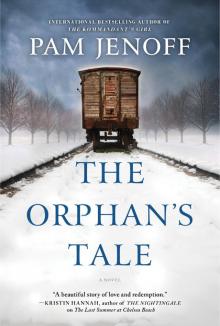 The Orphan's Tale
The Orphan's Tale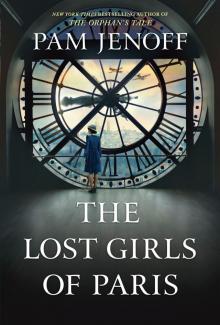 The Lost Girls of Paris
The Lost Girls of Paris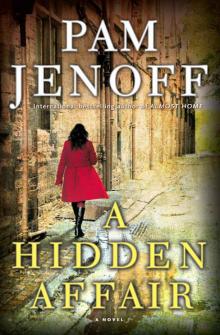 A Hidden Affair: A Novel
A Hidden Affair: A Novel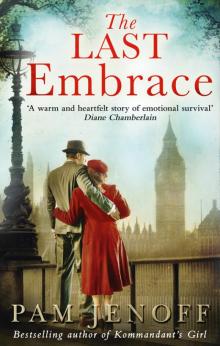 The Last Embrace
The Last Embrace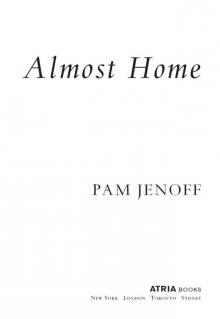 Almost Home: A Novel
Almost Home: A Novel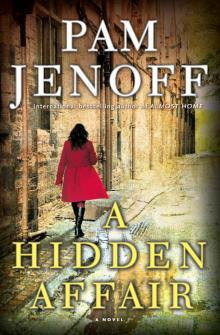 A Hidden Affair
A Hidden Affair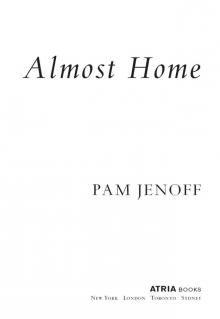 Almost Home
Almost Home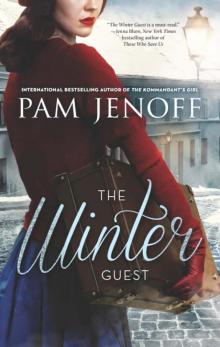 The Winter Guest
The Winter Guest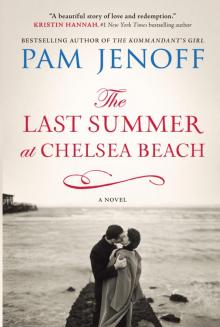 The Last Summer at Chelsea Beach
The Last Summer at Chelsea Beach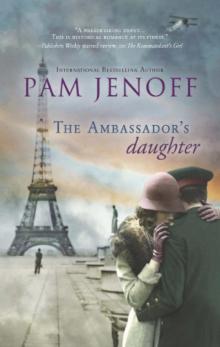 The Ambassador's Daughter
The Ambassador's Daughter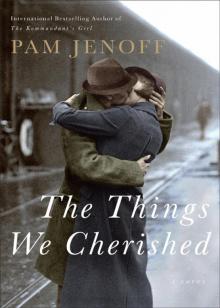 The Things We Cherished
The Things We Cherished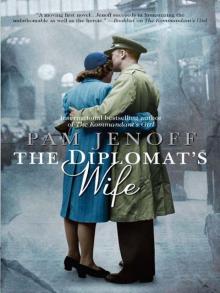 The Diplomat's Wife
The Diplomat's Wife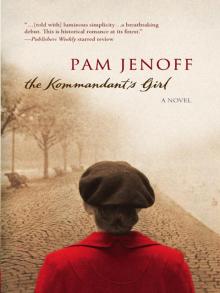 The Kommandant's Girl
The Kommandant's Girl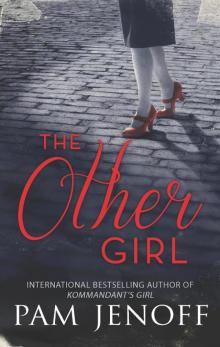 The Other Girl
The Other Girl